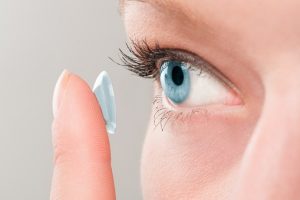 Acanthamoeba keratitis is a rare but serious infection of the eye, commonly seen in contact lens wearers. It is caused by a naturally occurring single-celled organism called an ameba. They can be found in water sources, such as tap water, hot tubs, and soil and sewage systems, and are essentially tiny parasites that can cause a serious eye infection in those who do not practice safe eye hygiene when using contact lenses.
Acanthamoeba keratitis is a rare but serious infection of the eye, commonly seen in contact lens wearers. It is caused by a naturally occurring single-celled organism called an ameba. They can be found in water sources, such as tap water, hot tubs, and soil and sewage systems, and are essentially tiny parasites that can cause a serious eye infection in those who do not practice safe eye hygiene when using contact lenses.
Sporadic outbreaks of acanthamoeba keratitis occur among contact lens wearers, according to the Centers for Disease Control and Prevention (CDC), as many eye care products were released to the market—which have since been recalled—that promoted acanthamoeba keratitis.
Acanthamoeba keratitis: Causes and who’s at risk?
Advertisement
Causes of this serious eye infection can be varied, but have the common theme of involving contaminated water. Contaminated tap water on contact lenses, or even using homemade contact lens solutions to store and clean them, as well as wearing your contacts in hot tubs, while swimming, or showering, can all be sources of the ameba being introduced to the contact lens.
Some speculate that recent increases in contact lens-related eye infections are a consequence of “no-rub” solutions for lens care, as they are not as effective for lens cleaning and disinfection. Others believe that disinfectants in the water supply added by new U.S. Environmental Protection Agencies may have inadvertently boosted this microbial risk, increasing the likelihood of having ameba in water supplies.
Regardless of where the ameba originates from, contact lens wearers are the most at risk for developing acanthamoeba keratitis, simply because they are constantly exposing themselves to potential eye contaminants. This doesn’t mean that those who don’t wear contacts are safe—they just have a significantly reduced risk. The following practices can increase your risk:
- Disinfecting lenses improperly (such as with tap water or homemade solution)
- Coming in contact with contaminated water
- Storing and handling lenses improperly
- Swimming, using a hot tub, or showering while wearing lenses
- Having a history of trauma to the cornea
Acanthamoeba keratitis signs and symptoms
Acanthamoeba keratitis infections can resemble the symptoms of other eye infections, of which there are plenty. If you suspect that you have a serious eye infection and are not sure of the cause, you should consult an eye doctor as soon as possible. Acanthamoeba keratitis infections can cause severe pain and possible blindness if left untreated. Symptoms of acanthamoeba keratitis infections may include:
- Eye redness
- Eye pain
- Sensitivity to light
- Blurred vision
- Excessive tearing
- Sensation of foreign object in the eye
Acanthamoeba keratitis diagnosis and treatment
Advertisement
The best thing one can do is to see a medical professional right away if experiencing the symptoms of acanthamoeba keratitis, as early diagnosis is essential for effective treatment and complication avoidance. Usually, a doctor will not immediately think your eye infection is due to an ameba but instead more commonly contracted forms of eye infection, which may prompt them to refer you to an eye specialist (optometrist). There the eye specialist will perform for detailed testing to identify the exact organism on the eye causing the infection and then prescribe an effective acanthamoeba keratitis treatment.
Acanthamoeba keratitis prevention tips
Fortunately, contact wearers are relatively safe if they practice good eye care hygiene, and by practicing the following tips, they can be confident that they have done all they can to prevent ameba infections from daily contact wearing.
- Never use tap water: The FDA has recommended that contact lenses should not be exposed to water of any kind
- Do not swim, shower, or use a hot tub: It is best to remove your contact lenses when performing these activities. If contact lenses are an absolute must, the use of airtight swimming goggles may help reduce water exposure to the contact lenses.
- Soak lenses every night: The use of disinfecting contact solution every night help kill the infecting agent. The use of saline solution will not act as a disinfectant.
- Wash your hand: It is important to keep your hands clean when preparing to handle contact lenses. Using soap and water is sufficient.
- Regular eye exams: Seeing your eye care doctor on a regular basis will ensure good eye health.
- Clean lenses properly: Your eye care provider will give detailed instructions on the best care management for your contact lenses, and it is important to follow them accordingly.
- Store lenses properly: Use of contact lens cases that allow them to soak in solution and can be securely sealed are best. Replacing these cases once every three months is also recommended.
Wearing contacts can be hazardous to one’s health if maintained improperly. Practicing good eye care hygiene is the best form of protection against acanthamoeba keratitis infections, but will not be an absolute deterrent. Contact lens wearers should consult with their eye care providers on the best practices for eye care, and which eye care solutions are best for them. If any of the previously mentioned symptoms were to present themselves, it is very important to seek help right away from your doctor.
